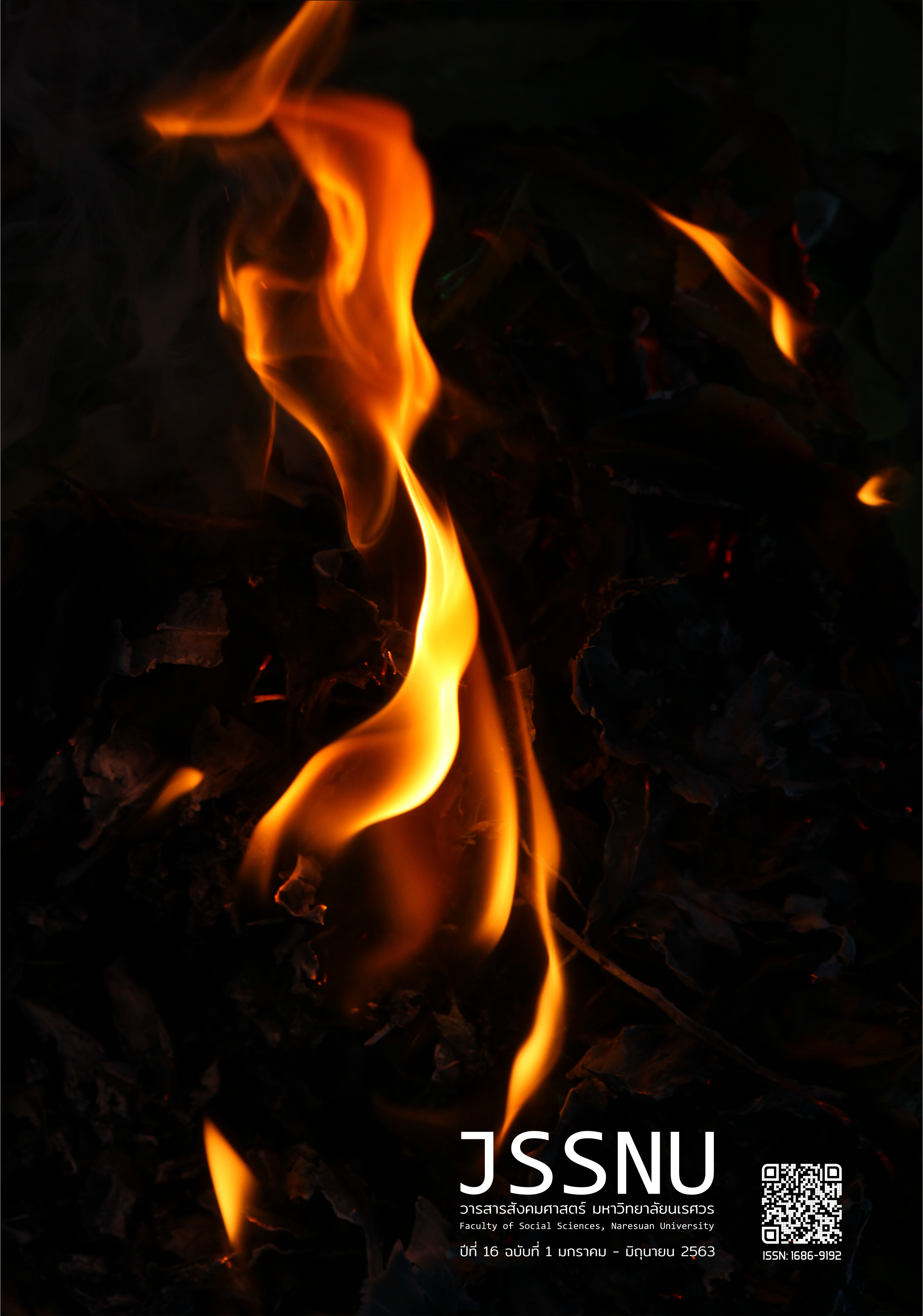Land Governance, Everyday Politics and the Wind Energy Project on Lands under the ALRO in Chaiyaphum Province
Main Article Content
Abstract
The disagreement between Thailand’s Agricultural Land Reform Office (ALRO) and judicial institutions in allowing wind energy companies to access lands under the ALRO stirs new debates on the righteousness of the ‘green energy’ enterprises’ use of the lands that the state has originally allocated for ‘agricultural uses’. In exploring how, in the first place, the company accessed the lands without encountering any overt protest, I draw on three approaches – land governance, powers of exclusion, and everyday politics. Based on qualitative research, I propose that from 2015 to 2016 a private company gained accesses to the ALRO lands in a village in Chaiyaphum province under two conditions. The first condition was changes in regulations that do not really contradict practices at local level and the reinterpretation of what should be counted as ‘farmer’s benefits’. Another condition was everyday negotiation between villagers and the company. The negotiation was underpinned by an ever-expanding ALRO land market, ‘intimate exclusion’ and the villagers’ hope, anxiety and understanding towards the wind power project.
Downloads
Article Details
References
Abraham, I., & Schendel, W. V. (2005). Introduction: The making of illicitness. In W. V. schendel & I. Abraham (Eds.), Illicit flows and criminal things: States, borders, and the other side of globalization (pp. 1-37). Bloomington: Indiana University Press.
Adas, M. (1986). From footdragging to flight: The evasive history of peasant avoidance protest in South and Southeast Asia. Journal of Peasant Studies, 13(2), 64-86.
Akarapongpisak, N. (2011). Rethinking state-village relations: Positive forms of everyday politics and land occupation in Thailand (1997 – 2010) (Doctoral dissertation). Canberra: The Australian National University.
Apinyawatcharakul, S. (2011). Legal consciousness of the farmers who purchase and sell ALRO 4-01 lands in Baan Chang Sub-District, Mae Tang District, Chiang Mai Province (master’s thesis). Chiang Mai: Chiang Mai University. [in Thai].
Bangkok Post. (2017, March 30). Alro clears wind farm development. Bangkok Post. Retrieved from https://www.bangkokpost.com/thailand/general/1223656/alro-clears-wind-farm-development
Benda-Beckmann, F. V., Benda-Beckmann, K. V., & Wiber, M. G. (2009). The Properties of Property. In K. V. Benda-Beckmann, F. V. Benda-Beckmann, & M. G. Wiber (Eds.), Changing properties of property. (pp.1-39). New York and Oxford: Berghahn Books.
Bernstein, H., & Byres, T. J. 2002. From peasant studies to agrarian change. Journal of Agrarian Change, 1(1), 1-56.
Chatterjee, P. (2004). The politics of the governed: Reflections on popular politics in most of the world. New York: Columbia University Press.
Daily News. (2017, February 2). 20 Companies who rent The ALRO land for wind farms – the list revealed. Daily News. Retrieved from https://www.dailynews.co.th/regional/552993 [in Thai].
Fairhead, J., Leach, M., & Scoones, I. (2012.) Green grabbing: A new appropriation of nature?.” Journal of Peasant Studies, 39(2), 237-261.
Hall, D., Hirsch, P., & Li, T. M. (2011). Powers of exclusion: Land dilemmas in Southeast Asia. Singapore: NUS Press.
Hirsch, P., & Scurrah, N. (2015). The political economy of land governance in the mekong region. Retrieved February 10, 2019, from http://www.mekonglandforum.org/sites/default/files/Political_Economy_of_Land_Governance_in_Region.pdf
Khaosod Online. (2017, March 29). Green light given to the ‘relieved’ sixteen wind farms. Khaosod Online. Retrieved from https://www.khaosod.co.th/economics/news_275776 [in Thai].
Khaosod Online. (2018, September 17). 957 Korat villagers filed a lawsuit against a wind power plant to the environmental division of the supreme court, demanding the plant’s closure. Khaosod Online. Retrieved from https://www.khaosod.co.th/around-thailand/news_1581549 [in Thai].
Konlanmuaeng, S. (2017). Chaiyaphum-The ALRO visited and inspected the wind farm suspended by the supreme court’s verdict. Retrieved January 30, 2019, from https://oknation.nationtv.tv/blog/suttipongnation/2017/02/12/entry-1 [in Thai].
Koonme, P. (2011). The Bt 10,000 million wind energy project and its interest-based network’s vicious cycle. Retrieved August 13, 2018, from http://www.manager.co.th/daily/ViewNews.aspx?NewsID=9540000067539 [in Thai].
Li, T. M. (2014). Land’s end: Capitalist relations on an indigenous frontier. Durham and London: Duke University Press.
Manager Online. (2017, March 16). Nineteen wind power companies’ Glee – Gaining approval to proceed from The ALRO. Manager Online. Retrieved from https://mgronline.com/specialscoop/detail/9600000027012 [in Thai].
Manager Weekly Magazine. (2014, December 6). Unmasking ‘Nopporn Suppapipat’, The nominee of energy capital, military and politicians. Manager Weekly Magazine. Retrieved from https://mgronline.com/daily/detail/9570000140384 [in Thai].
National Energy Policy Committee (NEPC). (2009). The NEPC resolution 6/2009 (the 128 th). Retrieved February, 23, 2019, from http://27.254.37.81/index.php/th/petroleum/price/price-lpg-internal/item/1280-nepcabhisit128#s4 [in Thai].
Ostrom, E., & Schlager, E. (1996). The formation of property rights. In S. Hanna, C. Folke, & K. G. Mäler (Eds), Rights to nature: Ecological, economic, cultural, and political principles of institutions for the environment (pp.127–156). Washington, DC: Island Press.
Palmer, D., Fricska, S., & Wehrmann, B. (2009). Towards improved land governance: Land tenure working paper 11. Retrieved February 10, 2019, from https://www.fao.org/3/a-ak999e.pdf
Pipoplaparnun, N., & Kaewkum, S. (2011). Background and history of land reform in Thailand. Retrieved July 17, 2018, from http://www.landactionthai.org/land/index.php/content/1288-19052011.html [in Thai].
Rungmanee, S. (2016). Illegal but licit: Migrant mobility and the negotiation of legality in the northeast Thai-Lao borderlands. Asia Pacific Viewpoint, 57(2), 221-231.
Sangkhamanee, J. (2011). Rethinking rural political cultures: Rural politics beyond electioneering and social movement. Journal of Sociology and Anthropology, 30(2), 45-80. [in Thai].
Scott, J. C. (1985). Weapons of the weak: Everyday forms of peasant resistance. New Haven: Yale University Press.
Settarangsri, S. (2018). Thepsatit’s villagers unnerved as a wind turbine exploded in korat: The scene was only 6 km. away from their village. Retrieved January 30, 2019, from https://www.77kaoded.com/content/201096 [in Thai].
Thai PBS. (2017, June 23). The NCPO unlocked the requirements for eligible users of The ALRO land, using section 44. Thai PBS. Retrieved from https://news.thaipbs.or.th/content/263754 [in Thai].
Walker, A. (2012). Thailand’s political peasants: Power in the modern rural economy. Madison: The University of Wisconsin Press.
White, C. P. (1986). Everyday resistance, socialist revolution and rural development: The Vietnamese case. Journal of Peasant Studies, 13(2), 49-63.


